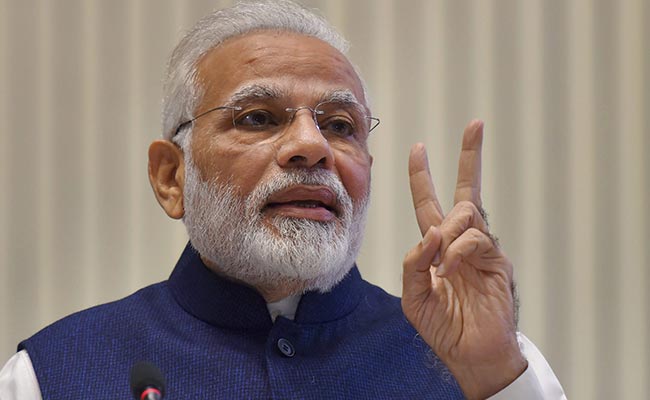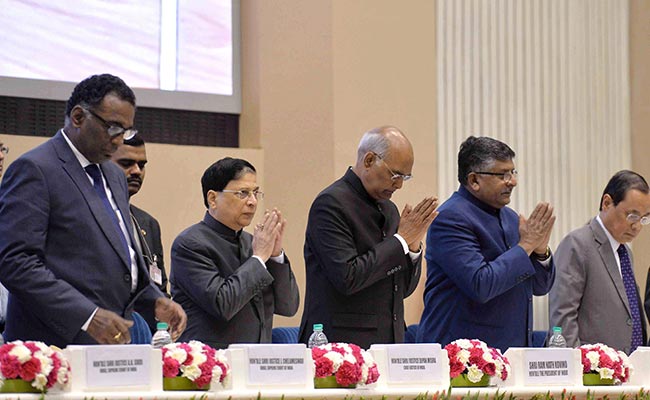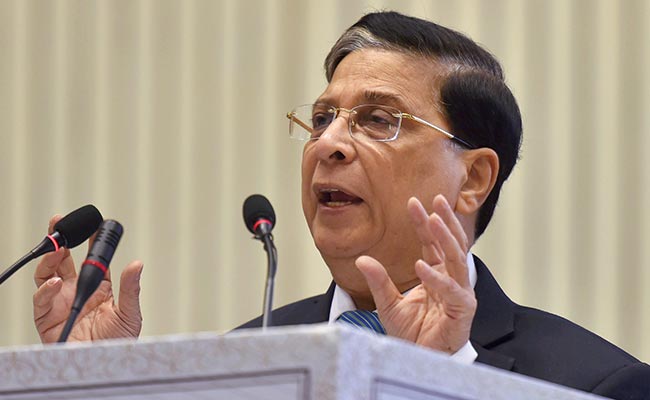
PM Modi addressed a gathering of judges and advocates at the National Law Day event.
New Delhi:
A day to celebrate India's constitution became a day that seemed to widen the fissures between two branches of government. While Prime Minister Narendra Modi stressed on the limits of the legislature, the judiciary and the executive, Chief Justice Dipak Misra and law minister Ravi Shankar Prasad appeared to spar over how far those limits went.
The prime minister also said that the three wings were part of the same family and they should work to strengthen each other and move forward keeping their limits in mind. While fighting for rights, PM Modi said, one should not forget about duties.
"They (the three branches) are members of the same family... we do not have to prove anyone right or wrong. We know our strengths, we know our weaknesses," he said at a gathering of judges and advocates at the National Law Day event in New Delhi. Also known as Constitution Day, it is celebrated on November 26 every year to commemorate the adoption of country's governing document.
 PM Modi emphasised that the balance between the executive, the legislature and the judiciary has been the backbone of the constitution helped the country during the Emergency.
PM Modi emphasised that the balance between the executive, the legislature and the judiciary has been the backbone of the constitution helped the country during the Emergency.
He also called for self-regulation and a system of checks and balances for the good health of any institution and quoted BR Ambedkar to state that there should be a limit for any authority.
Quoting Dr Ambedkar, PM Modi said, "The legislature may be free to frame any law, the executive may be free to take any decision, and the Supreme Court may be free to give any interpretation of the law."
"But the need of hour is that we strengthen one another. One branch understands the needs of the other. And in this, legislature, executive and judiciary must move ahead staying within the limits created by the Constitution," he added.
 Before the prime minister addressed the gathering, Law Minister Ravi Shankar Prasad reminded the judiciary of the principle of separation of powers between the judiciary, the legislature and the executive.
Before the prime minister addressed the gathering, Law Minister Ravi Shankar Prasad reminded the judiciary of the principle of separation of powers between the judiciary, the legislature and the executive.
He said the concept of separation of power is as binding on the judiciary as it is on the executive.
"The founding fathers of the constitution clearly wanted government must be left in the realm of those elected to govern by the people of India and accountable to the people through the instrument of parliament," he said.
Responding to the remarks, Chief Justice of India Dipak Misra said that "there should be mutual respect and there cannot be any claim for supremacy by any of the wings". "We are not really interested to bring any kind of policy. But the moment the policies are formed, we are allowed to interpret and see that they are implemented," he added.
 Justice Misra said that the dream of the Prime Minister is a literate, educated and digitally-enabled India and the judiciary is "playing the role of a constitutional catalyst" to achieve the goal.
Justice Misra said that the dream of the Prime Minister is a literate, educated and digitally-enabled India and the judiciary is "playing the role of a constitutional catalyst" to achieve the goal.
"The fundamental rights are in the core value and the bedrock of the constitution. An independent judiciary with the power of judicial review has been conferred with the power of the ultimate guardian of the constitution to strike a balance... to ensure that respective governments are functioning as provided by the law within their respective domains and citizens' rights have to be at the pinnacle," he said.
Justice Misra also rejected the suggestion that public interest litigation (PILs) were being used as a means to formulate policies and to govern the country.
He said there had been several writs and PILs which the Supreme Court has turned down. He also said that the apex court has been going "slow" on economic matters, particularly tenders and especially global tenders.
(With inputs from PTI)
The prime minister also said that the three wings were part of the same family and they should work to strengthen each other and move forward keeping their limits in mind. While fighting for rights, PM Modi said, one should not forget about duties.
"They (the three branches) are members of the same family... we do not have to prove anyone right or wrong. We know our strengths, we know our weaknesses," he said at a gathering of judges and advocates at the National Law Day event in New Delhi. Also known as Constitution Day, it is celebrated on November 26 every year to commemorate the adoption of country's governing document.

PM Modi spoke at the National Law Day event in New Delhi.
He also called for self-regulation and a system of checks and balances for the good health of any institution and quoted BR Ambedkar to state that there should be a limit for any authority.
Quoting Dr Ambedkar, PM Modi said, "The legislature may be free to frame any law, the executive may be free to take any decision, and the Supreme Court may be free to give any interpretation of the law."
"But the need of hour is that we strengthen one another. One branch understands the needs of the other. And in this, legislature, executive and judiciary must move ahead staying within the limits created by the Constitution," he added.

President Ram Nath Kovind also attended the National Law Day event.
He said the concept of separation of power is as binding on the judiciary as it is on the executive.
"The founding fathers of the constitution clearly wanted government must be left in the realm of those elected to govern by the people of India and accountable to the people through the instrument of parliament," he said.
Responding to the remarks, Chief Justice of India Dipak Misra said that "there should be mutual respect and there cannot be any claim for supremacy by any of the wings". "We are not really interested to bring any kind of policy. But the moment the policies are formed, we are allowed to interpret and see that they are implemented," he added.

Chief Justice of India Dipak Misra addressed the gathering at the National Law Day event.
"The fundamental rights are in the core value and the bedrock of the constitution. An independent judiciary with the power of judicial review has been conferred with the power of the ultimate guardian of the constitution to strike a balance... to ensure that respective governments are functioning as provided by the law within their respective domains and citizens' rights have to be at the pinnacle," he said.
Justice Misra also rejected the suggestion that public interest litigation (PILs) were being used as a means to formulate policies and to govern the country.
He said there had been several writs and PILs which the Supreme Court has turned down. He also said that the apex court has been going "slow" on economic matters, particularly tenders and especially global tenders.
(With inputs from PTI)
Track Latest News Live on NDTV.com and get news updates from India and around the world

